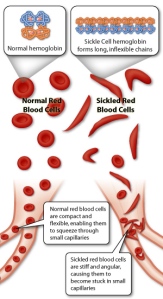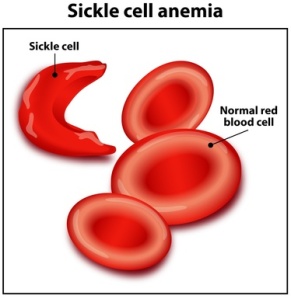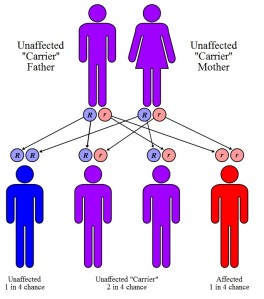Two weeks back I came across a lady who posted in a UK-based black on-line social community on Facebook seeking to have sponsorship and or support from fellow black persons, in her drive towards the Sickle Cell Society-UK.
Now this online social network group on Facebook which I recently joined, currently has about ~16,000 members who I do believe are actively involved in receiving notifications of all that is posted. It is a group after all that you request to join and not at all just open for the global public. So I am assuming that all members have at some point before being added have wanted to be added with the overall aim of furthering development, support, education etc, among the black community here in the UK.
The current numbers within this group total ~ 16,000. You would have thought or hoped that given a cause such as Sickle cell sponsorship or support would have provoked this amount of membership to respond to.
Sickle cell anaemia/disease or trait is after-all synonymous within us all the black people irrespective of where you happen to be born on planet earth. When you do the calculations from the the 16k membership, and with the minimum contribution of each member of £5, based on everyone donating the minimum of £5 you would have had over £81,300 towards this sickle cell charity which this lady would have worked positively for this lady ; and that’s at the bottom end of the scale. It is embarrassing that out of the membership numbers, only a couple of persons (~3) responded to the call.
It certainly could be the case that such social networks groups have differing objectives hence why such call outs for practical call out for such redress are not positively responded to.
The reason why I was one of the persons that responded to this call out for support is partly down to past experience. About three years back Ida Horner, a friend of mine in Surrey had set up a social enterprise charity through a belief that persons needed to be assisted with help to enable themselves to help themselves reach their potential as opposed to the usual route of charity. I’d believed in Ida’s ideology and still do, but soon found that the challenge was to get the Ugandan diaspora community to get on board. Various fundraising ventures were put in place, advertised etc, but still when it came to the realisation of these ventures to raise the much needed funds, we fell short of expectation. The community we were calling upon to give support or involve, just didn’t appear interested. The realisation came to be that the persons who heeded our call to support were completely out of the social or community of target. This has been a recurring pattern on so many occasions that in the end we ceased to even bother or try to reach out within the target community for support. The conflicting irony is that the black community upon seeing that the supporting persons are from the non-black community, react negatively and with suspicion.
Check the situation with Jazz music and performers or unique ethnic artists and you might begin to see…the audience that supports such artists is predominantly not from the black communities. Believe me, I have attended the some the shows in the South Bank during seasons when African artists are given a platform.
I work within both the NHS and academic or research sectors of UK’s institutions and have observed what the impact of  Sickle cell anaemia or disease has had on the black community in relation to treatment, management, research and funding. In addition, I have also observed cousins back in Uganda that have been fatally affected by sickle cell disease. Thus the call this lady made was of interest to me on two great and important fronts.
Sickle cell anaemia or disease has had on the black community in relation to treatment, management, research and funding. In addition, I have also observed cousins back in Uganda that have been fatally affected by sickle cell disease. Thus the call this lady made was of interest to me on two great and important fronts.
I fully understood the daunting or challenging task she faced having experienced similar in past fundraising ventures.
In all this observation, I am left with questions:-
Why is it so difficult or challenging within the black community/communities to enable, or encourage us black people to support persons who put themselves forward to raise funds that will give redress to finding solutions or management of ailments?
What can be done to get the black community to participate in a proactive manner towards resolution of issues that directly affect us all without coming across as politically motivated?

Trust me Nakate, even back home in Uganda we are not very good at having our backs (Helping each other) especially when it involves financing. I should say its so typical among we the blacks as contrally to the whites who make positive sense of smth which will help save lives in communities even when it isn’t in their countrty because they make lost of charity funding in many African communities. some times i think besides the poor mind set of blacks to such projects is the factor of raging poverty especially back here home, that hinders them to spend on fundraising than to cater for families , don’t know if poverty would affect the response of those in the diaspora . twitter @Mcfortuneroy
Thank for stopping by and commenting Julius.
It is certainly a challenge to get our own people on board in fundraising ventures. I am of the school of thought that we are by nature quite social people and coming together to help out is not an alien entity altogether to us. When you compare the concepts of “gwangwa mujje, munno mukabi, etc” persons from before used to heed calls for similar fundraising initiatives that benefited communities as a whole. I also find it hard to marry it down to poverty in terms of having something physical to give – on observation, poor persons give more in church donations when you compare it to a well-off person’s donation in relation to their wealth. It may not be from their meagre earnings but from their voluntary time in cleaning and caring (cleaning/beautifying) these institutes or supporting those that run them. I am coming to the realisation that with globalisation developing so fast, we perhaps as a black people have some way to catch up in the organisational way fundraising is done by those before us and how charities are governed or run. The challenge is in tapping in to raising awareness/marketing/publicising, mobilising, sensitising and accounting for such ventures along with the ability to keep a well planned and organised steering group in check. It is worth it in the end and I hope that we as a people can rise to this challenge and sustain it.